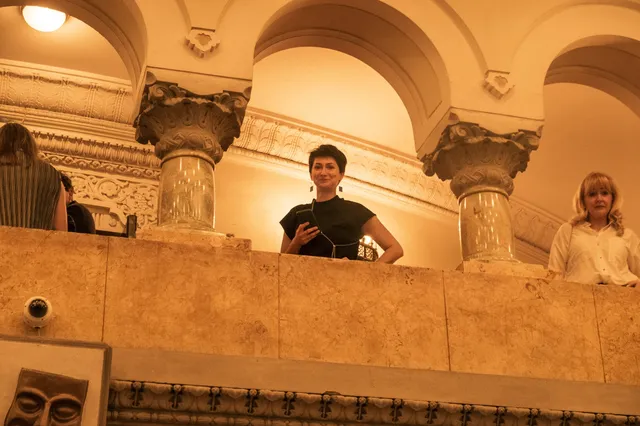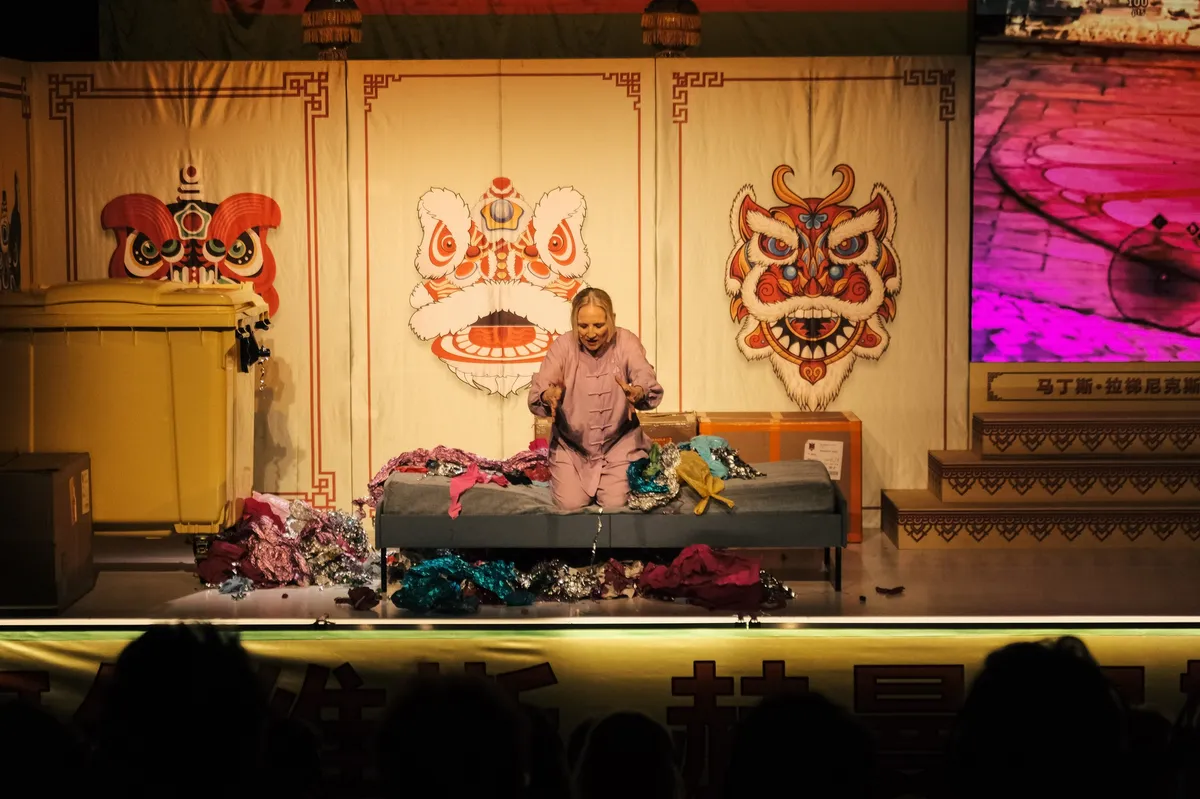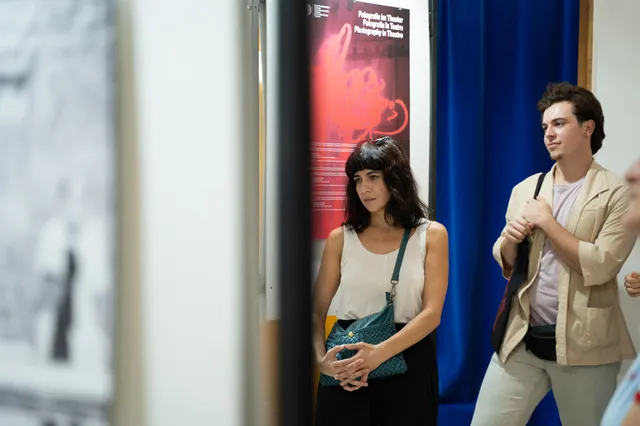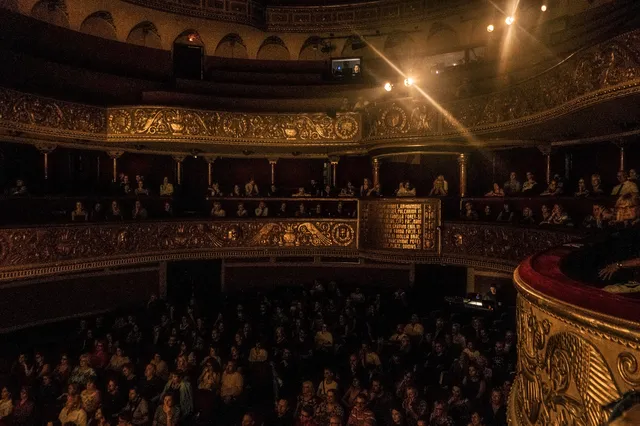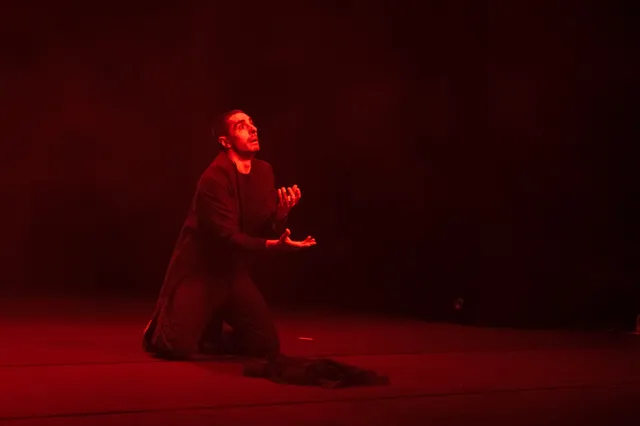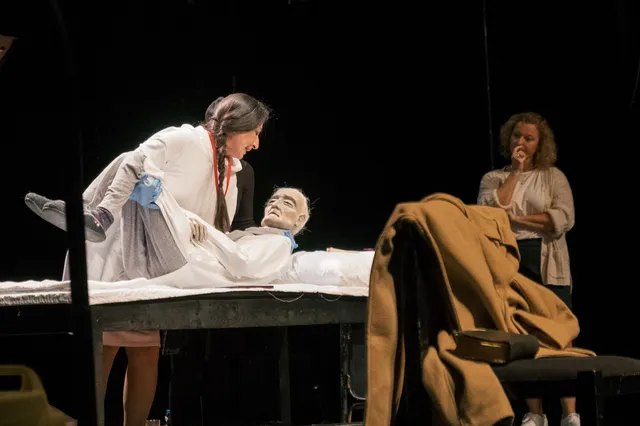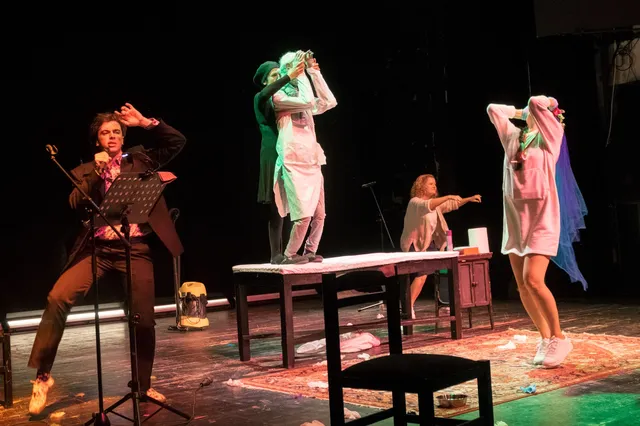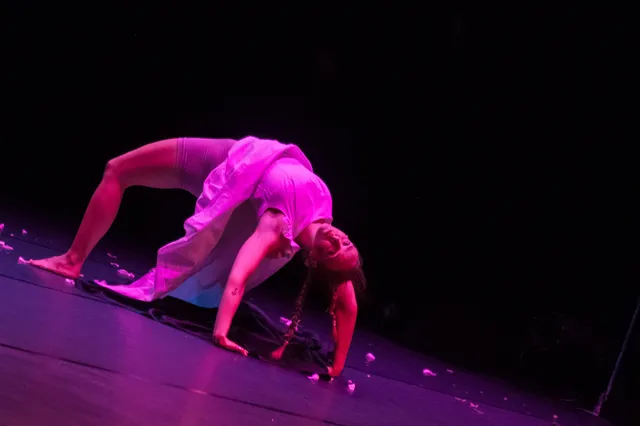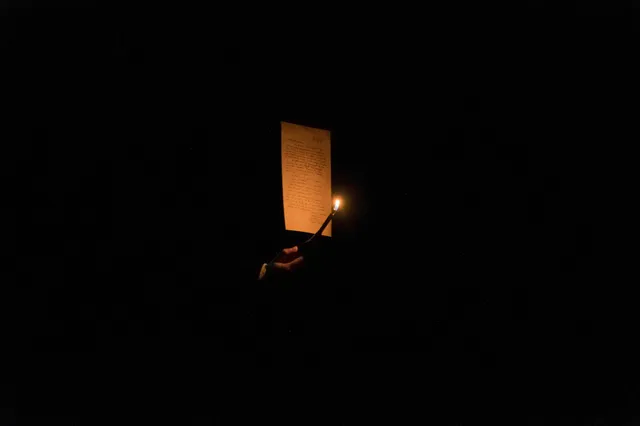Chronicle by Elena Jebelean
There's
nothing more natural than the distance to alter our perception of otherness.
Just as too much familiarity no longer allows us to distinguish what seems
self-evident. Those who have lived totalitarianism rediscover its absurdity in Everything Under the Sky, by Margarita
Zieda, directed by and with the scenography of Alvis Hermanis. On the one hand,
a Europe where Latvia is considered an eastern country, on the other hand, a
China where Latvia is considered a western country. Does that sound familiar?
The
show amazes, saddens and amuses – often the same stimulus stirs all three
states. The scenography with dragons drawn on the walls throws you into the
arms of kitsch. The magnificent paper dragons that end up filling the stage
towards the end, as if they were always alive and ready for confrontation, lead
you to the saving mythology. Personalized music through karaoke, from Whitney
Houston's I wanna dance with somebody
up to Chinese songs about sunrises, opposes hedonism to populism. The big phone
screen is placed in the middle of the stage, like photos of presidents in
institutions. And its role is central, it is the tool that connects, but also
tracks. The actors' play – two people carrying a three-hour show on their
shoulders like dragons – is not only convincing, but downright fascinating.
Astrida (Guna Zariṇa), facing the bewildering poses, becomes a battlefield
between rebellion and submission. "It is not on earth that we fight, but
in the depths of thought. I and the sky have been facing each other for a long
time, and neither of us is moving.” It is the phrases in her Chinese lessons
that warn her/us of the inability to accept the unthinkable reality. It is just
that Beijing's sky is obscured by the fog of pollution. She/we would stand face
to face with the sky if the fog barrier did not also install in us. Astrida,
the poet from Riga, with a volume of poems translated in China, has a
dream/imagines her visit there/even gets there. A node of plans. If this trip
is a nightmare or just the fruit of imagination, we can breathe relieved. But
what if it's reality?
The
way in which the woman learns Chinese, memorizing sentences whose logic is not
reflected in the world she discovers, reminds us of Eugen Ionescu's English without a teacher. In fact, she
knows that the Sixth Great Book, which she also consults in the National
Archives of China, warns of the unintelligibility of that world. She has it
twice in front of her eyes – neither the first time, immediately after coming
from Riga, nor the second time, after spending many years in China like in a
stupefying concentration camp, can she understand. The smell of her own
garbage, which she can't throw away, because she can't find out the code of the
refuse skip, doesn't help either. It also not helpful that she works at the
Social Credit Office, where she informs the respondents about the loss of their
loans, or that she is supervising compulsory gymnastics, by which the state
wants to keep citizens healthy and active until old age, so as not to grant
them pensions for too long. The planting of trees in the desert, the involvement
in the construction of the Great Green Wall, all of this does not help either.
The increasingly credible transformation into a Chinese woman, although blonde,
dressed in white, with a skirt adorned with beautiful embroideries – garlands
of green leaves and delicate, genuine roses, which are difficult to place in
the general counterfeit, also does not help. It is incomprehensible to her that
she cannot return home, not even after she has recovered her social credits.
Confucius' recommendation (this is how the show credits it), given by the
doctor of the last Chinese settlement in which we see her, does not help
either: “If on your way you found fools, ask yourself how they got in your way”.
Her
guide (and ours) in this Hell is the multiple-character narrator, played by
Vilis Daudziṇš. From him we find out details about the evolution of the show,
he also presents the thread of facts, but especially describes places,
reactions, states. In fact, the impression I had after the show is that the
most important, the most vivid, were the descriptions (how unusual in a
dramatic text, where, conventionally, the dialogue reigns – here, however, in
the dialogues often the replies did not connect, the communication was
unidirectional: the man cried out in the void, and the system constrictively
oppressed, generating hypocrisy, submission, silence). On certain scenes they
do not insist, those are apparently not completed. We are dealing with a show “under
construction”. But others are meticulously detailed because the atmosphere is
significant. Astrida in a bar, discovering the Chinese internet. Astrida
reading her poems and marvelling at the shortness of their translation into
Chinese. Astrida kicked out of the archives, for photographing the Sixth Book.
Astrida practicing Thai Chi. Astrida invited to dinner by the mother of a
potential suitor. Astrida meditating in the woods. All linked together with
humour, with serenity, a kind of Joyful Jail! hummed with the freedom of the one who creates.
To
understand and love your native place, you must wander through the world, at
least imaginary. In the final scene, Astrida sleeps at home. Maybe she has
returned somehow, as if by miracle. Maybe she has never left. Two contrasts are
brought together again – the message of her father who asks her to buy potting
soil for his flowers, for his gardening, but also the answer to the message
launched by her to the ocean, from a bar, in a plastic bottle among countless
others – darkness, silence, stillness. Death.
All
under the sky, under the same sky. A totalitarian world that abolishes
creativity versus one where the elderly can cultivate their garden, like
Voltaire. It's just that the sky is only one for all of us. Beijing's polluted
air, through which the sun can no longer shine, is twinned with the pesticide
poisoned soil of certain areas of America. Worldwide, after massive
deforestation that led to desertification, trees are planted that, through
their roots, remind us that forest plants warn each other about the dangers,
even the mycelia of fungi are like optical transmission fibres. Everything is
important, everything counts, each plant plays its role and contributes to the
re-energization of the whole that includes us, as well. And we, through our
irresponsibility, do not take care of the world, we forget that we are an
integral part of it, we have the illusion that we take care of ourselves,
while, in fact, by destroying the world, we destroy ourselves.
Is
it an ironic show about inequality? No, rather about equality. About the fact
that the bill for all the damages belongs to everyone. Once upon a time,
dragons lived in this world, wonderful creatures, strong and righteous, capable
of balancing the scale. To show people the middle way. To preserve the harmony
of the world. As natural and divine forces at the same time, they brought
fruitfulness and prosperity, they were generous and wise. Their breath, sheng qi, was the essence of life. It
formed the seasons, it brought rain, it brought warmth through the sunshine, it
brought wind from above the seas and fertile soil into the land. They made sure
that the world – a paradise garden – stays a garden, bordered by forests.
Whether we will manage to make new forests from our deserts inside and outside,
still is to be seen. I hope the thought gauge will always remain faulty. I add
a reading recommendation – Ruxandra Cesereanu, Un singur cer deasupra lor (A single sky above them), Polirom,
2013. And here I add a sigh, one of the so expressive sighs of the
Romanian-language interpreter, who came out of neutrality and nuanced his
voice, amusing himself and shivering with the actors, and with us.
---
“Theatre Chronicle @
Eurothalia” is a programme conceived by Daniela Șilindean together with the
team of the German State Theatre Timișoara, within the Eurothalia 2023 European
Theatre Festival, held between 20-30 September 2023, financed by the National
Cultural Program Timișoara - European Capital of Culture in 2023.
